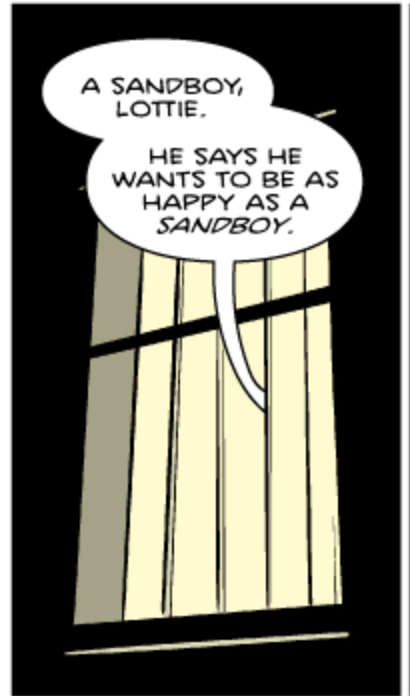"Happy as a sandboy"
« previous post | next post »
TIL a new word — well, a new compound: sandboy. And an associated collocation, "happy as a sandboy".
 The source was today's Bad Machinery, which includes the panel on the right.
The source was today's Bad Machinery, which includes the panel on the right.
The author, John Allison, notes that
I got nervous after making this comic that “happy as a sandboy” is racist, but apparently a sandboy was a youth paid to collect dry sand from coastal caves to spread on saloon bar floors. I know. Dodged a bullet there.
The comments include a link to an attempted explanation in The Guardian, "What is a sandboy and why are they happy?" — but as usual, there's more to the story.
The OED glosses sandboy as
A boy who hawks sand for sale. In proverbial phrase as happy (or jolly, etc.) as a sandboy.
with citations back to 1821:
1821 P. Egan Life in London ii. v. 289 Logic..appeared to be as happy as a sand-boy, who had unexpectedly met with good luck in disposing of his hampers full of the above-household commodity.
1823 ‘J. Bee’ Slang Sand-boy, all rags and all happiness; the urchins who drive the sand-laden neddies through our streets, are envied by the capon-eating turtle-loving epicures of these cities. ‘As jolly as a sand-boy’, designates a merry fellow who has tasted a drop.
1841 C. Dickens Old Curiosity Shop i. xviii. 187 The Jolly Sandboys was a small road-side inn.., with a sign, representing three Sandboys increasing their jollity.
1841 E. FitzGerald Lett. (1889) I. 70 We will smoke together and be as merry as sandboys.
As usual, it's easy to antedate the citations, for example to a poem by Samuel Jackson Pratt from an 1805 collection, Harvest Home:
Of course, there are lots of more frequent similes — happy as a __ (clam | lark | pig in muck | prince | king | the day is long | etc.).
And there are also reverse similes (if that's the right term) as a way of saying that someone is not happy at all. The OED offers happy as (a wet cat | a basset hound with a toothache), but it's easy to think of others.
I'll close with an image of that volume's title page, with reference to "Trends in book titles" (8/5/2022):


ardj said,
September 5, 2022 @ 9:14 am
Le Monde today: Marchands de sable : enquête sur l’exploitation effrénée d’une ressource stratégique
[(myl) See also Matt Simon, "Greenland’s Melting Glaciers Spew a Complicated Treasure: Sand", Wired 9/1/2022.
In neither story is there much evidence of happiness…]
Philip Taylor said,
September 5, 2022 @ 10:50 am
TIL a new abbreviation: "TIL". But for me, "happy as a sandboy" dates back to my earliest memories, so for maybe 70 years. It never struck me that the expression might be racist, but of course I am delighted to now learn that it is not.
Robot Therapist said,
September 5, 2022 @ 3:47 pm
"TIL" = "today I learned" is my guess?
[(myl) No need to guess — the internet explains, and it's even in the dictionary…]
Yuval said,
September 6, 2022 @ 12:28 am
So he spends time in saloon bars spreading the sand, gets a taste from the barkeep, hence the happiness?
Kate Bunting said,
September 6, 2022 @ 4:07 am
Agree with Philip Taylor that 'happy as a sandboy' is a well-established, if somewhat outdated, expression in the UK.
David Marjanović said,
September 6, 2022 @ 1:07 pm
What I find intriguing here is the pro-drop: "What dost sell there", "Hast got a large stock?".
That mirrors the Bavarian-Austrian dialects of German, but there it has a very simple phonetic cause that I wouldn't think applied to English.
Philip Taylor said,
September 7, 2022 @ 2:56 pm
Wel, the first improves the scansion over the alternative "What dost thou sell there", but the second could have been cast as "Hast thou a large stock" without affecting the scansion. Perhaps the poet felt that that as he had elected, for stylistic reasons, to drop the pronoun from the opening question, he should, for reasons of consistency, maintain the same style in the second.
Don said,
September 8, 2022 @ 9:41 pm
Why is it desirable that there should be sand on saloon bar floors?